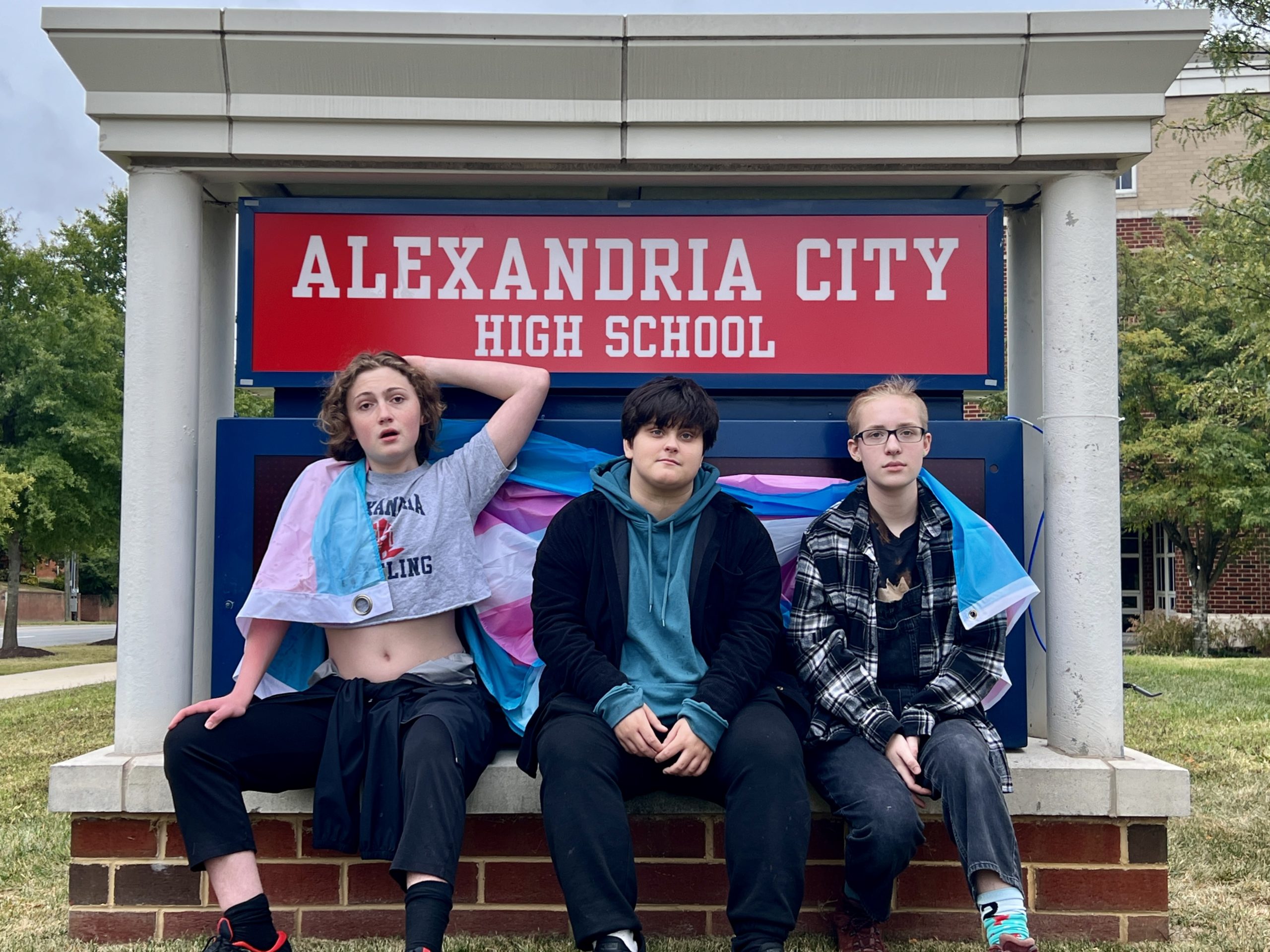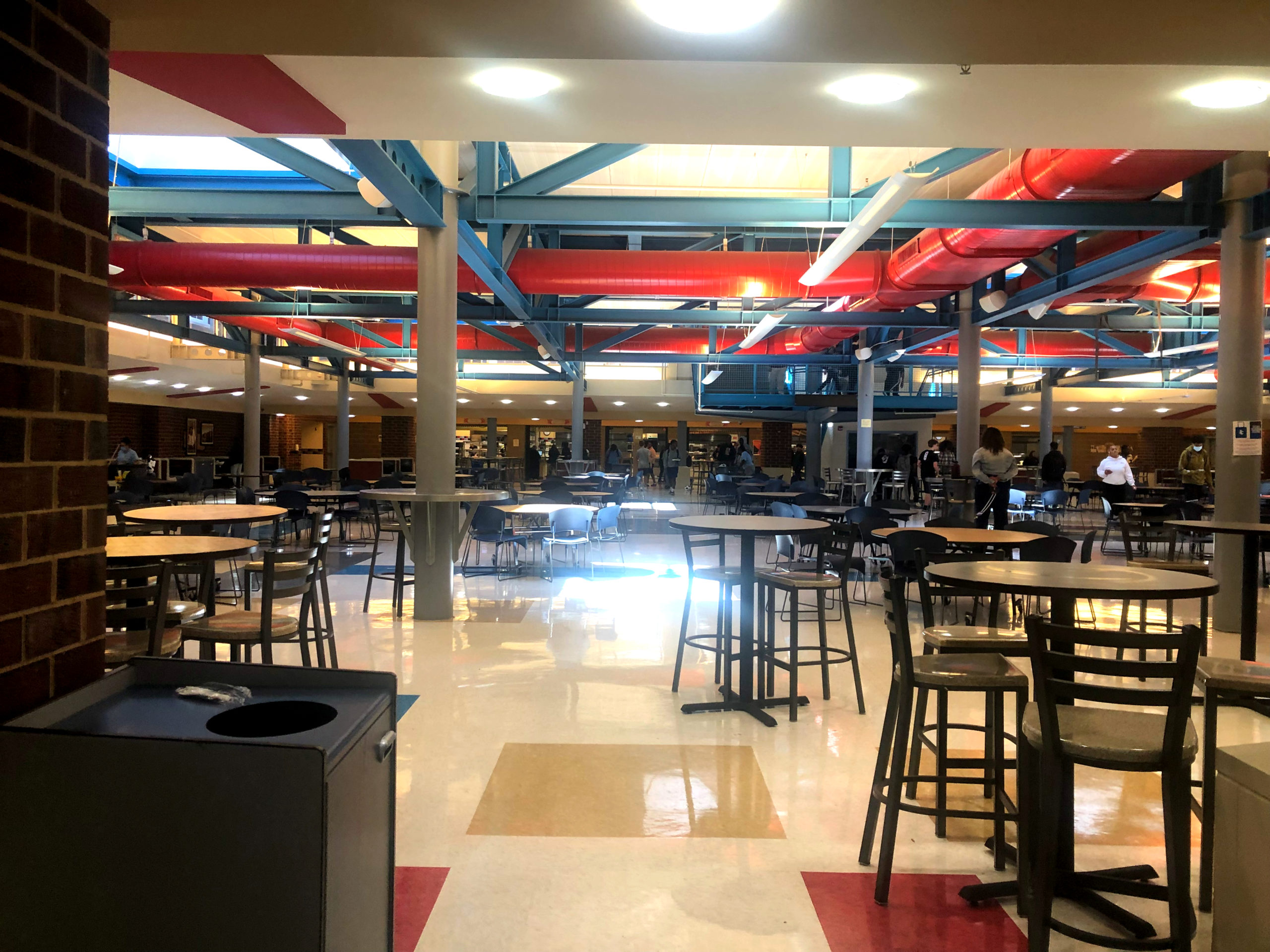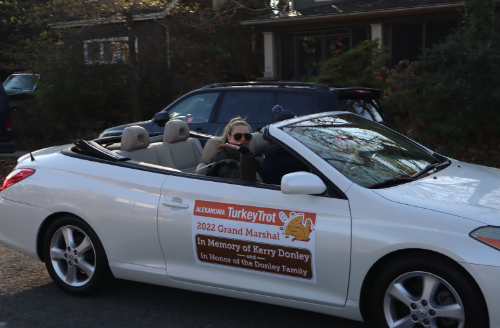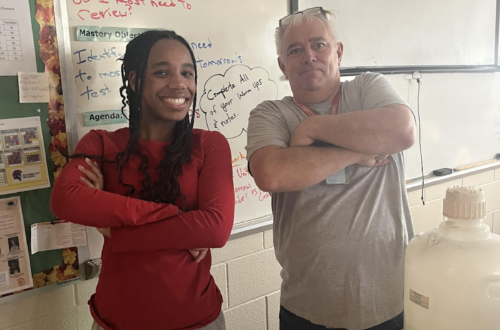Transgender, non-binary and gender-diverse students in an increasingly hostile America
Yahney-Marie Sangaré
Editor
On September 16, the Virginia Department of Education released new model policies for school boards addressing the treatment of transgender students. The models mandated misgendering, outing and sex-based bathrooms, alongside optional parental restrictions on student counseling services. Immediately, the policies sparked widespread reactions throughout social media. Twitter thrummed with thousands of opinions, calls to action and profile picture changes as the country, state and community weighed in on Governor Youngkin’s latest swing at student rights in the name of “empowering parents.”
On the same day, transgender students at ACHS woke up to the right to their names stripped away by Glenn Youngkin’s administration. Junior MC Finegold-Sachs, who is non-binary and goes by they/them pronouns, remembers feeling shocked. “I honestly couldn’t believe it was real,” they said.
As social media flooded with impassioned responses to the model policies, Alexandria’s leaders promptly took to condemning the legislation. On September 17, Mayor Justin Wilson described the policies as “egregious” and “hateful.” On September 19, ACPS interim superintendent Dr. Melanie Kay-Wyatt released a statement that announced that ACPS did not plan to comply with the guidelines.
Jesse*, a trans-man who goes by he/him pronouns, was not surprised by the state’s release. “When I read it, I was scared; who wouldn’t be? I was scared because I’m not out. It’s not super safe for me to be out,” he said. “I kind of expected it. [Alexandria] is a comparatively more progressive spot in Virginia . . . I always figured it would be okay [here], but I never expected it to not happen, because we’ve been seeing [anti-transgender policies] in a lot of places where we were like, ‘That won’t happen.’”
Organizational response in Virginia was almost immediate. On September 19, the Pride Liberation Project, an LGBTQ+ rights organization based out of Fairfax, called for state-wide school walkouts to be held on September 27. Although the walk-out did not occur in full at ACHS, over 100 walk-outs were held across Virginia schools, including schools in neighboring jurisdictions Arlington and Fairfax. Senior Spencer Klaus, who is non-binary and goes by they/he pronouns, attempted to organize a walk-out via social media when they found out that other schools were staging them.
Senior Spencer Klaus sits on a bench in front of a tree with a transgender flag wrapped around their shoulders.
Although Klaus described the ACHS walk-out plan as a very “spur of the moment thing” and regretted putting it on social media, they stood by their views on the importance of the protest. “The point of civil disobedience is that you are disobeying something to bring attention to the matter. A walk-out has so much more relevance to this issue, because schools are directly affected by it,” they said.
The problem spans much further than the model policies. Nationwide, the rise in transphobic rhetoric has been detrimental to transgender youth. A report by the Human Rights Campaign revealed that in July 2022, the month following Florida Governor Ron DeSantis’ passage of the “Don’t Say Gay or Trans” law, discussions around transgender ‘ideology’ and ‘grooming’ increased by 406%. High-profile figures and conservative politicians’ doctrine alongside a growing fear campaign against transgender people parallels a 41% increase in anti-transgender hate crimes from 2019 to 2020. Transphobic policies have been instituted in some form in 34 of the 50 states, according to a map created by the Freedom for All Americans campaign. Although the majority of anti-transgender rhetoric is spurred by conservative or right-wing movements, a sect of the feminist movement on the left has triggered the rise of trans-exclusionary radical feminism (TERFism) which views gender as strictly sex-based and often seeks to restrict gender-affirming healthcare, practices and inclusion.
Transgender youth, in particular, are feeling the impact first-hand. Youngkin’s model policies accompany bills across the nation that specifically target children, especially concerning the prescription of gender-affirming health care, such as hormone blockers. These policies are being pushed in states such as Oklahoma and Alabama and have become a popular component of Republican platforms, often on the basis of ‘protecting children’ or ‘empowering parents.’ The legislation also targets schools. Echoing Virginia’s required ‘transparency’ model policies, legislation in Alabama forbids school personnel from ‘withholding’ information about a student’s gender identity from their parents and requires them to report any information they may receive to what could be an unaccepting or dangerous household. It also makes the practice of gender-affirming health care on a minor a Class C felony.
Junior KD Bectel smiles in front of the ACHS sign with a trans flag around their shoulders.
These bills do not come without consequences. “It’s incredibly dangerous and based on facts that just don’t exist. It’s incomprehensible, the decisions they’re trying to push and make,” said junior KD Bectel, who identifies as transgender and non-binary and goes by they/them pronouns. “I can’t describe in words how mad it makes me, and how unsafe it makes students at ACHS feel.”
A fervent nationwide conversation about bodily autonomy has been connected to the policing of transgender people’s, especially youth’s, bodies. Although the ‘gender critical’ movement often isolates these issues, many insist they are inherently connected.
“I’ve seen a lot of infantilization of [trans youth]. I know first-hand how [transphobes] treat us like babies,” said junior Mira Andrade, a trans-girl who goes by she/they pronouns. “Transphobes believe that parents should be able to deny trans students from using their names and pronouns, since they ‘know better,’ while also saying that they can’t make decisions regarding health care, since they ‘don’t know any better.’ It’s contradictory. I think they know that. They just don’t care, kind of like with vaccines and abortion: ‘My body, my choice.’”
“[Bodily autonomy] is a connected battle and we need to be allies for each other . . . Gender-affirming care is lifesaving,” said Jesse. “Having to go back into the closet would basically be a death sentence for me. Not having control over your own body is terrible.”
Finegold-Sachs echoes the sentiment. “I’m still big on feminist issues, even though I’m not a female.” Finegold-Sachs identifies as a non-binary lesbian and stated that although labels can “get confusing,” they “just want to be able to live and be happy.”
The wave of violent anti-transgender rhetoric complicates to which extent transgender youth in America can enjoy that freedom. As much as Alexandria can feel like a haven, this issue hits close to home. Jesse described transphobia at ACHS as often occurring “behind someone’s back.”
“My trans-feminine friends get the brunt of it; they’ll be called slurs in the hallways. It’s gross,” he said. He went on to describe incidents where he was called the d-slur “casually” and described an incident in which a female student continuously said the f-slur without the teacher intervening. “I think I present pretty trans, but to most people, I look like a masculine woman, and people are terrible to butch and masculine women,” he said.
Senior Michael Goldsberry grins in front of the ACHS sign with the trans flag around his shoulders flowing in the wind.
Senior Michael Goldsberry, who is trans-masculine and uses he/him pronouns, also spoke about harassment against transgender students in schools. “I’m more lucky to have a masculine appearance, but [for] people who are less lucky and people who are not out, it’s very detrimental. People at other schools have been abused for just using the bathroom they identify with. That’s something that needs to change,” he said.
Students described the diversity of opinion on trans rights. Everett*, a non-binary senior who goes by they/them pronouns, said, “I feel unsafe in certain groups and safe in other groups. I have my community of friends and people . . . but there are also other groups of people who are actively homophobic and transphobic.”
With the rising fervor of the anti-transgender movement, there may even be rifts within the LGBTQ+ community. Goldsberry described going to a GSA (Gender and Sexuality Alliance) club meeting in ninth grade and being made fun of by the other students. Klaus echoed the sentiment. “What we see today is a constant in history: that being gay and bi . . . is more culturally accepted and understood than being trans. That’s because there hasn’t ever really been a huge understanding of trans people: that they exist, and you can see [being transgender] in so many ways. It’s not just a boy wearing a dress,” they said.
Sophomore Chris stares contemplatively off-camera, wearing an Alexandria Wrestling cropped shirt with the transgender flag around their shoulders. They stand in front of the ACHS sign.
Sophomore Chris*, who identifies as non-binary, said “I feel like a lot of people need to remember that anything that affects cis women will always affect trans women ten times harder. I think that there is a whole lack of empathy . . . Right now, we’re trying to go backward, and I think that can be really counterproductive in helping further humanity.”
In the face of unapologetically transphobic sentiment, students emphasized the need for everyone to actively combat transphobia and show allyship to transgender youth in particular.
“I feel like everybody [in Alexandria] has a pretty anti-Youngkin stance, but as I’ve started to learn more about gender identity and how people react to it, I’ve started to pick up on things that people in this area do that give off very bad connotations,” Klaus said. They urged the community to continue to care about transgender activism. “Always show support to [counties] that don’t say [their school boards] are going to resist [the new model policies]. For the city itself, continue to resist it, and continue to work with those trans students about how to increase their comfortability at school.”
“I feel like I’m able to exist, but at the same time, I feel like if the root of transphobia continues to not be solved, which— it’s a long way— if that doesn’t happen, people will always have this sort of bigotry in them,” said Everett. “I feel like [ACPS] hasn’t done anything to either spotlight trans people or harm trans people. It feels like you’re kind of existing, but you’re not seen as much as you should be [and don’t] have the ability to feel completely safe and comfortable.”
Jesse emphasized the genuine emotional impact that transphobic rhetoric has. “I want to drive home the point that I’m really angry. I’m really mad. I try not to be mad at cis people because being mad and mean doesn’t get me anywhere, but I don’t want to be palatable for cis people,” he said. “Trans people are super normal; speak to a trans person! It’s upsetting when [trans students] become this boogeyman for cis people. It’s gross, it’s terrible. They’re just teenagers.”
Andrade said that although she has privilege in having supportive parents and access to legal and medical gender affirmation, she still sees how “nefarious” the rhetoric and policy can be. “I’m in the best position. I’m incredibly lucky and privileged in this regard . . . These people are pushing for our elimination, but I won’t be complacent. They can count on that,” she said.
The three students sit with the transgender flag around their shoulders in front of the sign. From left to right: Chris, Michael Goldsberry and KD Bectel.
Multiple students brought up the importance of teachers in making schools safe for transgender students. Often, this means calling out anti-transgender language and incidents in the classroom, as well as making it obvious that they are accepting and supportive from the beginning.
“I’d say [we need] better education and training for teachers,” said Andrade. She also brought up how services for students, especially sex education connecting to LGBTQ+ topics, would help clear misunderstandings about transgender people. “[Misconceptions] online parallel what I see people say in school,” she said.
“There aren’t safe spaces for specifically LGBT youth to access that are safe and appropriate . . . LGBT students and kids need a community so badly, and it’s so important that we work towards building those spaces for LGBT kids by LGBT kids,” said Bectel.
Alongside bringing up student organizations that provide safe spaces, including the It’s Whatever You Make It (IWYMI) club, students emphasized the need for the work done to be active, tangible and effective.
“If ACPS wants to try to fight against Youngkin’s new law, push for more private bathrooms for our schools, especially in middle schools,” said Goldsberry.
“A lot of GSAs tend to be very unsafe spaces for POC who are also [LGBTQ+], so clubs like IWYMI hit the hammer right on the nail on intersectionality,” said Chris. For ACPS, Chris made the need for active protection and allyship clear.
“Rainbow flags are not enough,” they said.
*Name changed or truncated for anonymity.
All photos by Yahney-Marie Sangaré for Theogony.






